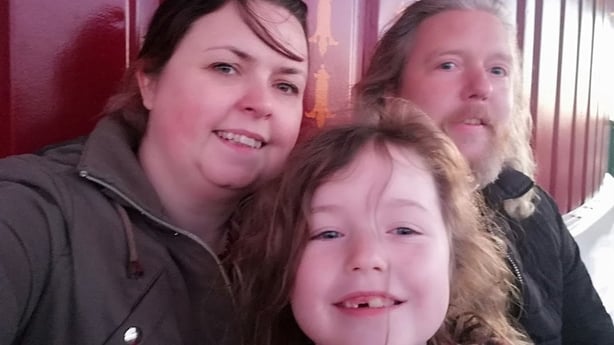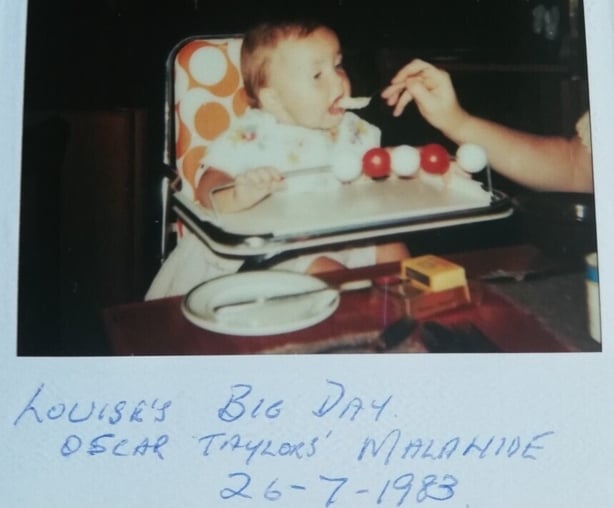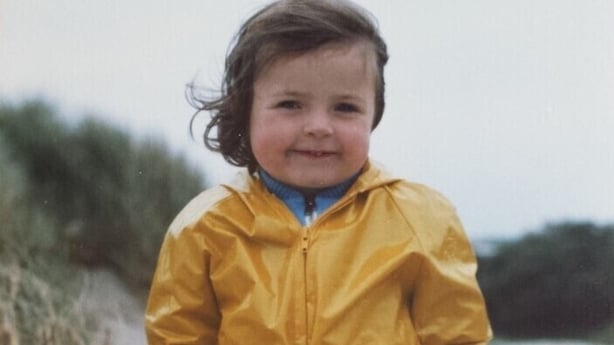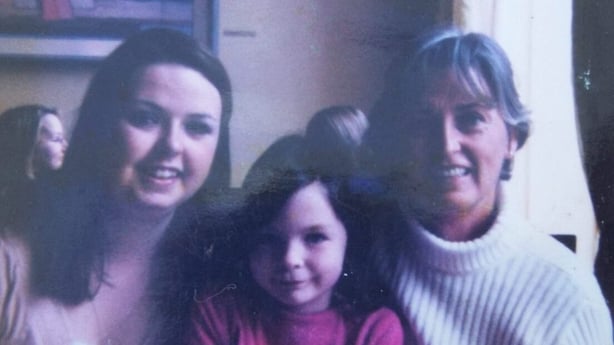Legislation for the provision of a mother-and-baby institution redress scheme will return to the Dáil this week.
The bill has been strongly criticised by survivors' groups, who say it unfairly excludes children who spent less than six months in an institution and is creating division among survivors.
Louise Clarke is one of those children.
Born in St Patrick's Institution on the Navan Road, Co Dublin in 1982, she was adopted from the home within weeks of her birth.
She had a good upbringing but was "very anxious" as a child and always questioned the impact those formative months had on her life.
"I was very nervous about things and I used to cry a lot. Then as a teenager I had a lot of problems with depression and also into adult life," Ms Clarke said.
"I'm doing a lot better, thankfully. But you know, the therapists do strongly believe that it's some sort of an attachment issue - that an attachment is formed very much in the first few weeks of your life. So, there are times I wonder what if this didn't happen to me, would I be maybe scared to try new things or anxious in social situations? Does it come from that?"
Ms Clarke is now based in the Netherlands, where she has children of her own.
"For anybody who is a parent, just think about those first few weeks of your own child's life and how much comfort they needed when they couldn't sleep through the night," she said.
"And just imagine that child was in the room with 20 other babies with only one or two people looking after them. Can you imagine that doesn't have an impact on them?"

Following her birth, her biological mother Esther Doherty was instructed not to touch her newborn.
Speaking from her home in the US, Ms Doherty says mothers were dissuaded from the primal urge of skin-to-skin contact.
She says her time in St Patrick's Institution was "a nightmare", where the girls and young women were treated as "low lives" and "less than second class citizens".
Ms Doherty distinctly remembers the ward where she and 25 other women did not know what was going to happen when they went into labour and how, following birth, she was stitched questionably by a student nurse.
There was no pain medication.
She also remembers a room of around 30 babies who were cared for by one or two nuns.
All of them under six months old, all without the nurture, love and care of their mothers. Ms Doherty did hold her daughter before she left the institution.
Forty years on, her primal instinct is pushing her to fight for her daughter and all the children who will be excluded from the redress scheme.
"I'm outraged, I mean, beyond anger", she said.
"I'm not being sexist, but why should we let a bunch of men in politics, again, trample on us females. That our voices are not important, that my baby was a non-entity. She's a non-factor.
"You know that enraged me as a mother, and I'm more enraged that she's excluded than anything."
Two years ago, mother and daughter contributed to the Oak Report which was commissioned by the Department of Children following the publication of the Mother and Baby Home Commission report.
The purpose of the Oak consultation - which was conducted in March and April 2021 - was to obtain the views of survivors, their families, representatives/advocates and other interested parties, on what should be included in the proposed financial Restorative Recognition Scheme.

The report said it was evident from the online consultation meetings and the written submissions received, that the majority supported a universal, inclusive scheme.
The largest proportion of written submissions stated that all mothers and babies who resided in mother-and-baby homes should be eligible for redress, regardless of the duration or year of their stay and regardless of whether children were accompanied or unaccompanied by their mothers.
Survivors, advocacy groups and the majority of TDs that have spoken about the legislation thus far, say the proposed scheme does the opposite, excluding children who were in homes up to six months, mixed race children and those who were boarded out.
Ms Clarke said she got involved in the Oak consultation process - established by the Department of Children - in good faith but that good faith had not been returned.
"We feel that's a bit of a slap in the face considering we went in with good intentions and we thought that we would receive the same back," she said.

Considering that around 40% of survivors are being excluded from the redress scheme, there is huge concern over the division that this is creating.
It is viewed as pitting survivors against each other based on the length of time they have spent in a home and a money saving exercise by the Government.
"It's completely about the principle and not about the money for survivors in general", she said.
"I can't say if it would have been better if my mother had the support to keep me. But what we do know is what did happen to us and that is that we were not treated well as babies and being taken away from our mothers we know that does have a long-term impact on a lot of people."
Read more: Mother-and-baby home redress bill could reach €1.6bn if all children included
Minister rejects amendment to mother-and-baby redress scheme
Mother-and-baby report critical of former ministers
Minister for Children Roderic O'Gorman has reiterated that the payments scheme is one element of the range of responses by the State to survivors and former residents.
These include counselling services for all survivors and former residents, the Information and Tracing Act, the establishment of a national centre for research and remembrance, support for local memorial initiatives, the appointment of a special advocate, a children's fund to provide supports for children who are currently experiencing disadvantage, and work to advance the excavation, exhumation and identification of the remains of infants in the Tuam burial site.
All commendable, but as Ms Clarke points out, one response does not negate another.
"Getting access to our information is the priority, but it wasn't the only thing that was said," she said.
"It was, we want this (information) and then we want a further discussion about redress".
While mother and daughter united about 20 years ago, Ms Clarke did request her information from the Adoption Authority of Ireland and Tusla.

On St Brigid's Day last month, Adoption Authority of Ireland documentation revealed that there are three weeks following her birth which are unaccounted for before she was adopted.
Ms Doherty was of the understanding the day that she left the home, her daughter would be picked up by her adopted family that evening. The files indicate otherwise.
Ms Clarke is awaiting her remaining documentation from Tusla in the hope it will fill in some blanks.
However, the Adoption Rights Alliance has been critical of the information that is being provided.
We need your consent to load this rte-player contentWe use rte-player to manage extra content that can set cookies on your device and collect data about your activity. Please review their details and accept them to load the content.Manage Preferences
Susan Lohan of the Collaborative Forum on Mother and Baby Homes and the Adoption Rights Alliance has found that in her own case, the information was scant and raised more questions than answers.
Indeed, Tusla is currently experiencing backlogs that it does not expect to clear until the summer.
Up to last week, it had received 7,032 applications since the service launched in October last year, from people seeking their birth and early years information and to trace a relative.
If the Government is reliant on the satisfaction of survivors regarding a scheme that provides them with information rather than redress, it needs to be flawless. This is not the case.
Now, the redress scheme is adding further trauma to survivors according to Ms Doherty.
"It's brought a lot of stuff up. I think this is worse than the actual trauma if that makes sense," she said.
"You know, because they're looking at us like - you're not important. You got pregnant; you weren't married. That's what you get for being that type of person. The 'fallen woman'."
She also believes that the religious orders responsible for this trauma need to pay up, not the taxpayer.
Asked if there were discussions taking place between the Department of Children and religious orders in that regard, a spokesperson said the Government believes that all relevant parties have a collective responsibility to respond to Ireland's legacy in relation to the mother and baby institutions.
"Discussions in regard to seeking a contribution from the religious congregations towards the Mother and Baby Institutions Payment Scheme are ongoing," a spokesperson said.
"While these discussions are ongoing, they are being treated as confidential. Accordingly, it would not be appropriate to say anything further on the matter at this time."
Ms Clarke is keen that the strong objection of survivors to the legislation is recorded for future generations.
"I want it to be known that we tried. If you look at the initial report that the Commission came out with, it kind of put the blame on society of the time and said that's just the way people treated women who got pregnant outside marriage and that's just the way it was," she said.
"We want to put our objection on record, as it were now, so that if in 50 years someone is looking back and says, how did they treat women in 2022-2023, that they'll see that, yes, we were treated like this. We were excluded, but we weren't happy about it. We didn't accept it."







